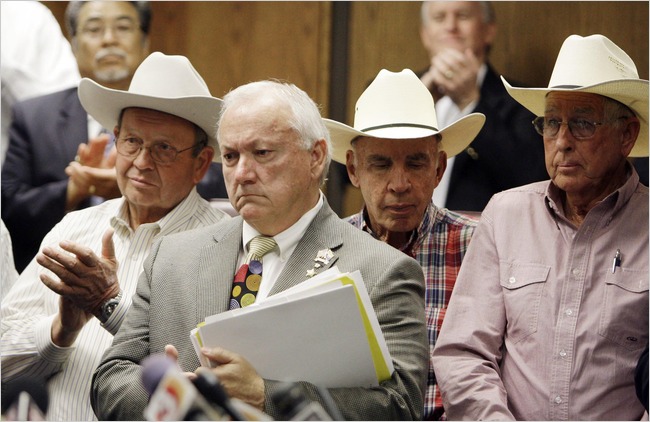PHOENIX (By Randal C. Archibold, NYT) April 20, 2010 ― The Arizona Senate passed one of the most stringent immigration laws in the country on Monday, marking a new level of influence for a Republican state senator who not long ago was seen by many as an eccentric firebrand.
Passage of the law, which would, among other things, allow the authorities to demand proof of legal entry into the United States from anyone suspected of being in the country illegally, testified to the relative lack of political power of Arizona Hispanics, and to the hardened views toward illegal immigration among Republican politicians both here and nationally.
As if to underscore how the political landscape will be changed by the law, Senator John McCain, Republican of Arizona, who had refused to back the most extreme anti-immigration measures, came out in support of it just hours before its passage.
“I think it is a good tool,” said Mr. McCain, who is being challenged in a primary by a conservative former congressman who is thumping him on immigration. Mr. McCain added he believed the bill reflected frustration the federal government had not done enough to secure the border and enforce immigration law.
The state senator who wrote the law, Russell Pearce, had long been considered a politically incorrect embarrassment by more moderate members of his party — often to the delight of his supporters. There was the time in 2007 when he appeared in a widely circulated photograph with a man who was a featured speaker at a neo-Nazi conference. (Mr. Pearce said later he did not know of the man’s affiliation with the group.)
In 2006, he came under fire for speaking admirably of a 1950s federal deportation program called Operation Wetback, and for sending an e-mail message to supporters that included an attachment — inadvertently, he said — from a white supremacist group.
But Mr. Pearce, 62, cannot be dismissed as just the party’s right-wing fringe. As chairman of the Senate’s appropriation committee, he controls whose bills are financed, and he has shown an uncanny knack to capitalize on this border state’s immigration anxiety.
While surveys show immigration is less of a hot-button issue than it was a few years ago, Republican conservatives still care about the issue. In a New York Times/CBS News poll released last week, 82 percent of self-identified Tea Party supporters said illegal immigration was a “very serious” problem.
The nightly news here is filled with stories of raids on drop houses filled with immigrants and drug-related shootouts and home invasions. Mexico’s drug violence has bloodied Nogales, Sonora, across the border from Nogales, Ariz. And just a couple of weeks ago, a southern Arizona rancher was killed on his property by someone the police suspect was involved in smuggling.
“Senator Pearce is the one to articulate things and take bullets and arrows,” said Stan Barnes, a former Republican legislator and political consultant who has supported Mr. Pearce. The issue, he said, “has electrified and energized a great many Arizonans.”
More than a few Democrats took notice Mr. Pearce, whose district is in Mesa, a Phoenix suburb, managed to win unanimous support for the bill from House Republicans, even from some moderates who had voiced misgivings about it.
One of those moderates, State Representative Bill Konopnicki, Republican of Yuma, said planned amendments to address legal and other concerns never materialized. In the end, he said, “everybody was afraid to vote no on immigration.”
“We are going to look like Alabama in the ’60s,” said Mr. Konopnicki, who is facing a tough election and did not believe voting no would change the outcome.
In the Senate, only one Republican, Carolyn S. Allen, voted against the bill, and she is one of the few leaving office because of term limits and not seeking another post. She did not respond to a message left at her office.
The bill makes it a state crime for immigrants not to carry authorization papers, requires the police “when practicable” to check the immigration status of people they reasonably suspect are in the country illegally and allows people to sue cities and counties if the law is not being enforced.
Gov. Jan Brewer, a Republican who, like Mr. McCain, is facing primary challengers from the right, is widely expected to sign the bill, though her spokesman said she would not comment.
That the bill has gotten this far has angered advocates for immigrants, who have staged protests and sent a stream of postcards to the governor urging her to veto it.
But analysts said its legislative success may be another sign that, while the Hispanic population is growing here, a large number of Hispanics are under age or are not citizens and so are less powerful than those in California, New Mexico or Texas.
“Right now, there are supporters of the bill who are thinking, We don’t need that vote,” said Rodolfo Espino, a political science professor at Arizona State University who studies ethnic voting trends. “With a low Hispanic voter turnout, they are not going to be made to pay a price for this.”
State Representative Ben Miranda, a Democrat and co-chairman of the legislature’s Hispanic caucus, agreed. In other border states, Mr. Miranda said, “there is much more political clout in the Hispanic community.” And Arizona feels the effects of immigration more acutely, as the state with the most arrests for illegal crossing and drug trafficking across the border.
“Arizona is the funnel to the United States,” he said. “It’s not California. It’s not Texas. It’s not New Mexico. People are in hysteria here. It is totally different.”
People on both sides of the debate see the bill as a result of the failure of President Obama and Congress to overhaul the immigration system, and predict other states, as they have in the past, will be inspired by Arizona to consider similar legislation.
Mr. Pearce, who did not return a telephone call, has said he is on a mission to rid the state of illegal immigrants and discourage others from coming.
Mr. Miranda and others wonder whether Mr. Pearce’s personal experience motivates him: his son, a Maricopa County sheriff’s deputy, was shot and wounded in 2004 by an illegal immigrant and Mr. Pearce, a former sheriff’s deputy, was shot and wounded while arresting gang members 20 years ago, he has said.
But on the floor of the Senate, which approved the bill 17 to 11, Mr. Pearce said he pushed the bill because the federal government had not done enough.
“This law is not about race,” he said. “It’s about what is illegal.”
























